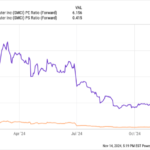The past year and a half have been a whirlwind for Nvidia (NASDAQ: NVDA).
The surge in demand for artificial intelligence (AI) applications following the introduction of ChatGPT has led to a frenzy among major tech players, rapidly devouring Nvidia’s GPUs. This feeding frenzy has resulted in a staggering upsurge in revenue and earnings for the chip giant, propelling Nvidia’s stock price to soar by a monumental 425% since the inception of ChatGPT on November 30, 2022.
The Ripple Effect: Nvidia Faces the Music
However, a different tune is now resonating through the halls of Congress and the corridors of Wall Street.
An array of key figures in the stock market has begun parting ways with Nvidia, opting to hedge their bets on two alternative AI-focused stocks that may hold greater promise in the eyes of astute investors. The question lingers: should you join the bandwagon and think about shedding Nvidia stock?
But why have these influential players decided to distance themselves from Nvidia?
A cohort of lawmakers on Capitol Hill have been relinquishing their stakes in the company, including prominent figures like Michael McCaul, John Curtis, Ro Khanna, Josh Gottheimer, Dan Meuser, Tom Suozzi, and Dan Newhouse. Concurrently, eight renowned billionaires have also been reducing their holdings in Nvidia significantly, as evidenced by their latest filings with the SEC, including Israel Englander, Jeff Yass, Steven Cohen, David Tepper, Philippe Laffont, Chase Coleman, and John Overdeck and David Siegel of Two Sigma Investments.
Shifting Tides: The New Contenders in the AI Arena
Simultaneously, as the exodus from Nvidia unfolds, a strategic migration towards rival Advanced Micro Devices (NASDAQ: AMD) is gaining momentum.
The lawmakers who once parted with Nvidia are now embracing AMD, such as Michael McCaul, Josh Gottheimer, and Markwayne Mullin. Additionally, notable billionaires have started to add AMD to their portfolios, with Ole Andreas Halvorsen, Ken Griffin, Ken Fisher, and Philippe Laffont among those taking the plunge.
The future appears bright for AMD in the AI GPU domain, with the company poised to capture a larger share of the market in the long term. While AMD has faced challenges in competing with Nvidia’s data center GPUs, recent developments like the MI300X AI accelerator and Instinct MI300A accelerated processing unit indicate a potential shift in the tide. Despite a subdued second-quarter sales outlook following its first-quarter earnings release, AMD’s foray into inference chips could offer a significant growth opportunity.
A Paradigm Shift: Picking Winners in the AI Race
As the sands of change swirl in the AI investment landscape, one company shines almost as brightly as Nvidia – Microsoft (NASDAQ: MSFT).
Following a hefty $10 billion investment in OpenAI at the beginning of 2023, Microsoft has strategically positioned itself as a frontrunner in the AI domain, with a strong foothold in enterprise software and Azure services.
Investor Frenzy: Microsoft’s AI Dominance Gives Wall Street and Congress a Run for Their Money
Microsoft, once an underdog in the tech world, has emerged as a champion in the lucrative realm of artificial intelligence. As its cloud computing platform blossoms with success, investors on Wall Street and even members of Congress have taken notice, diving headfirst into the tech giant’s promising future.
Political Figures and Billionaires Jump Aboard
The allure of Microsoft’s AI capabilities has not escaped the discerning eye of some prominent figures. Notable representations from Congress, spanning both parties and various states like New Jersey, Texas, North Carolina, and Massachusetts, have made recent purchases of Microsoft shares. Simultaneously, heavyweights in the investment world, such as Ken Fisher and Stanley Druckenmiller, are pumping significant funds into Microsoft, backing the tech powerhouse for future gains.
Azure’s Meteoric Rise
Microsoft’s cloud computing division, Azure, has been a hotbed of activity, reporting a staggering 31% sales growth in the last quarter. This expansion surpasses its competitors, a sign of the tech giant’s prowess in the AI arena. Management credits this surge to the insatiable demand for AI services, with immediate needs outpacing their current capacity.
Copilot Software Revolution
Beyond Azure, Microsoft’s Copilot software, fueled by generative AI, is revolutionizing productivity across various sectors. As a titan in enterprise software, Microsoft stands at the forefront of selling subscriptions for its AI software. The company’s innovative approach and leadership are propelling it toward unparalleled success in the market.
Locked and Loaded: Why Microsoft Reigns Supreme
Despite Microsoft’s forward PE ratio of 29.8x, a premium compared to the market at large, the tech giant holds a firm grip on its domain. Switching from Microsoft services is akin to leaving a luxurious, well-appointed mansion to dwell in a drab hovel—simply put, an unattractive prospect. Azure’s appeal to developers further solidifies Microsoft’s eminent position, as the costs of migration act as formidable barriers, anchoring customers securely in place. For discerning investors, Microsoft remains a wise choice, beckoning the smart money and, perhaps, your investment as well.





